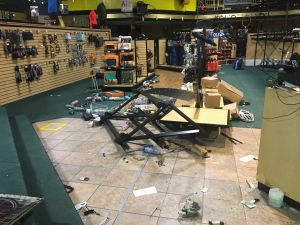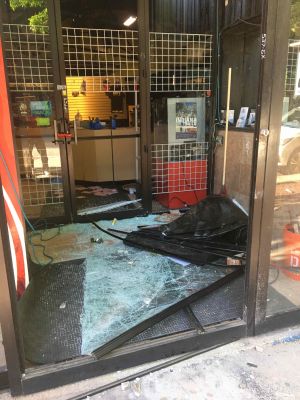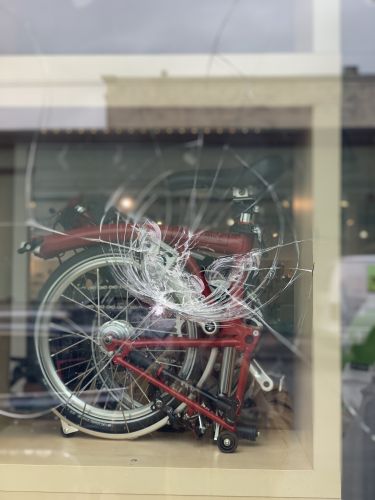A version of this story ran in the February issue of Bicycle Retailer & Industry News.
PORTLAND, Ore. (BRAIN) — Smash-and-grab thefts from bike shops have risen dramatically during the COVID-19 pandemic. But the phenomenon has led shop owners in several markets to start organizing and cooperating to share information. Some also are working more closely with local law enforcement, with mixed results.
BRAIN reported on a rash of shop break-ins in a March 2020 cover story, reported just before the pandemic took hold. It was already a problem. But since then, shop owners and law enforcement say the well-publicized nationwide bike shortage and boom in demand has fueled a bigger wave of theft.
"People are more desperate than usual," said Eva Frazier, co-owner of Clever Cycles in Portland, Oregon. The shop has been broken into three times since the pandemic began.
Besides the bike demand, other factors contribute, she said. "During COVID, the streets are really quiet. The comedy club upstairs is closed so there's no eyes on the street. And the cops seem to be tied up with other things and are not responsive to our calls after a break-in."
Frazier related the pain of smash-and-grabs. "One time, the crooks really knew what they were doing," she related. "They targeted high-end Gocycle electric bikes. Another rock-through-the-window incident was more random. They took three or four bikes, we called the police and they didn't show for more than an hour. We ended up losing 11 bikes in total."
Some shops have had better luck with police engagement. When Urban Shark in downtown St. Louis, Missouri, had its windows smashed during the George Floyd protests in June 2020, owner Mike Weiss called officer Joe Pierce, who is the bike mechanic for the 50-member police bike response unit.
"Mike said they had lost 14 bikes," Pierce remembered. "We had close to 50 officers on bikes in the area. When we went to the shop, we immediately grabbed back seven of the bikes from looters and within an hour we recovered and brought back all but one bike to the shop."
Shops are organizing locally to both minimize the chance of break-ins and to get their stolen goods returned. Some are more intentional than others. Tim Wesolowski, co-owner of CatSix in Portland, had two break-ins within a month.
"We sent a note to a handful of shops we're friendly with," Wesolowski said. "We communicated about how people are getting in and how to minimize the 'next time.' We've talked about how to come up with a better form of communication between shops to get info out a little faster and wider."
Boulder, Colorado, bike shops got organized early in the pandemic when they lobbied state, county and local authorities to have bike shops declared essential businesses. Russ Chandler, owner of Full Cycle, led this effort. "We collected emails from all the local shops and went to the governor with a united front. Boulder is a small and very supportive community, which makes a group effort easier here than in large metro areas."
Three Boulder shops were broken into in December 2020. The police department quickly pursued and apprehended two thieves. Maris Herold, Boulder's police chief, is a former mountain bike racer who owns six bikes.
"There's some evidence to suggest that high-end bikes are ending up in Mexico," Herold said. "We've done surveys of local shops, (asking) 'what can we do better to help prevent break-ins?' I've had a bike stolen myself and I know how much bikes mean to people."
Boulder's community engagement officer Mitch Trujillo detailed the ways in which Boulder PD is supporting shops. "We get with each shop owner to make recommendations on ways to target-harden their shop. We encourage natural surveillance, camera surveillance, and employ techniques in the store that make it harder for the crook to get in and get out," Trujillo said. "Our officers are using bait bikes, conducting investigations, providing education for securing bikes, and promoting bike registration with the shops and customers."
 Ten miles north, in Lyons, Colorado, the situation is quite different. Dave Chase of Redstone Cyclery expressed frustration with law enforcement's response after his two break-ins in 2020. "I rely on the Boulder County Sheriff's office, and they have been totally unresponsive to my continued pleas for an investigation," said Chase.
Ten miles north, in Lyons, Colorado, the situation is quite different. Dave Chase of Redstone Cyclery expressed frustration with law enforcement's response after his two break-ins in 2020. "I rely on the Boulder County Sheriff's office, and they have been totally unresponsive to my continued pleas for an investigation," said Chase.
Retailer Jim Kersten of Edgebrook Cycle in Chicago used his e-mail list of shops to coordinate communication among area shops. "During the riots this summer, Kozy's got hit twice in a week," recalled Kersten, who also runs the CABDA trade shows, referring to a long-time Chicago retailer. "We got surveillance video and a list of stolen bikes with serial numbers, put together a post and sent it out. My shop got broken into twice and fortunately there was nothing much to steal."
"We're hearing that smash-and-grab bikes are sold in alleys for $20," Kersten continued. "We've also gotten reports of thieves collecting 10 or 15 nicer bikes and taking a van to Milwaukee or St. Louis where no one will be looking for them."
One resource mentioned by both Wesolowski and Chandler is Bike Index, a non-profit bike registry that's recovered over $13 million worth of bikes stolen from shops and individuals. Co-founder Bryan Hance called 2020, "...a mother of a year for smash-and-grabs at shops. Once everything locked down in the spring, no one wanted to use public transportation. Then we saw massive step-back by law enforcement stretched thin by protests in Portland. Shops were broken into three or four nights in a row."
Bike Index is primarily focused on registering and recovering bikes for shops. "We have 50 people across the country getting shop POS systems with serial numbers tied into the Bike Index system," Hance noted. "When shops get robbed, we're immediately sending out intel."
Hance called OfferUp and Craigslist "f***ing cesspools. We trace thieves through these apps and we now know the full names and addresses of people who rob shops."
When all else fails, Clever Cycles' Eva Frazier recommends dealers keep their perspective and their sense of humor around smash-and-grabs. "I paid 99 cents to change the ring tone on my phone. Now if there's a break-in, 'Eye of the Tiger' wakes me up in a fighting mood."


